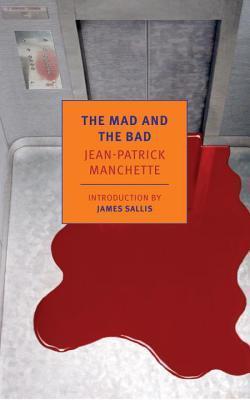The Mad and the Bad, by Jean-Patrick Manchette and translated by Donald Nicholson-Smith
The Mad and the Bad is my fourth Manchette. I’ve now read every one that I’m aware of having been translated into English so it’s fair to say I’m a bit of a fan.

Michel Hartog is a cold and arrogant businessman whose “smile resembled the coin slot of a parking meter.” As the novel opens he’s visiting a private psychiatric hospital where he’s hiring newly-discharged inmate Julie Ballanger as a nanny for his nephew Peter. Ballanger’s spent five years inside which makes her an interesting choice.
By all accounts Hartog is something of a small-scale philanthropist employing those who might otherwise struggle to find work. As his driver notes:
The cook is epileptic. The gardener has only one arm, pretty handy for using the shears. His private secretary is blind. His valet suffers from locomotive ataxia – no wonder his meals arrive cold!
In that context a former psychiatric patient as nanny seems natural enough, but Hartog doesn’t seem the sort of man who cares much about the welfare of others. Soon after her arrival Hartog is encouraging Julie to help herself to his well-stocked drinks cabinets (plural intentional) and he seems to have no affection at all for young Peter.
Peter has his own issues. On his first meeting with Julie he loses his temper and smashes his television. Hartog simply orders another. Peter can have anything he wants, can break anything and know it will be replaced, the only thing he isn’t given is affection. Julie is the first person to show him any kindness at all.
Julie is the protagonist here and it’s quickly apparent that not all is quite right with her either. She washes down tranquilisers with whiskey and her past includes petty theft and arson. She thinks she looks like a “post-op transsexual” but the reactions of others show that’s not the case. She has absolutely no experience of working with children.
Things get stranger yet when a menacing stranger named Fuentes appears and beats Hartog bloody. Hartog likes to portray himself as a gifted businessman – a visionary shaping the world. The reality is that he inherited his wealth from his dead brother and Fuentes is a former business partner so enraged by some old betrayal that his attacks have become habitual.
Add to the mix a dyspeptic English assassin named Thompson and what follows is a typically savage Manchette tale. Thompson is plagued by possibly psychosomatic ulcers and can only relieve the pain of them by killing. He’s been hired to kill Peter and Julie will soon be the only thing standing in his path.
Manchette is always political and this is no exception. On the surface Hartog is what society asks us to aspire to – he is rich, successful, he creates employment and his wealth trickles down to his employees. In reality he’s the product of unacknowledged good fortune. He hasn’t earned what he has but he’ll fight to the death to keep it.
Julie on the other hand is unhinged. She is quite genuinely dangerous (as one rather unfortunate motorist who picks her up and tries it on with her discovers). Her madness puts her beyond societal norms and ironically it’s her feral qualities that now prove essential to her survival.
Much of the book is an extended chase with Thompson and his associates pursuing Julie and Peter across France. The action culminates in a masterful set-piece where the assassins follow Julie and Peter into a supermarket where their frustration boils over resulting in a running gun battle through the aisles of this consumerist temple:
Coco watched fragments of plastic toys spraying into the air along the path of his bullet. He was trembling. In his hand was an old Colt revolver, solid, crude, and with a tendency to shoot to the right. For a split second he caught sight of Julie and Peter down an aisle and he fired again, winging a carton of laundry detergent.
The Mad and the Bad is darkly funny. The absurdity of a society which praises men like Hartog and which thinks it’s important which of variously labelled but ultimately identical soaps you buy is mirrored here in the absurdity of Hartog’s domestic arrangements; Thompson’s increasing gastric distress as Julie continues to elude him; and a brutal fight to the death amidst canned goods and product displays. The title suggests a dichotomy between Julie (the mad) and Hartog (the bad) but the reality is that the distinction isn’t so easily drawn.
This isn’t my favorite Manchette (that would still be Three to Kill), but it’s still a blazing thriller with a challenging political undercurrent. The mad may be dangerous, but it’s the sane who hire killers and profit from death.
Other reviews
Guy Savage wrote about this here and went a little more into the politics than I have. I agree with pretty much everything Guy says.
If you want to check my other Manchette reviews they are: Three to Kill; The Prone Gunman; and Fatale.
Filed under: Crime Fiction, French Literature, Manchette, Jean-Patrick, Noir Tagged: Patrick Manchette

